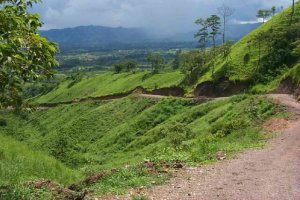If You Were to Visit Me in El Hato

The following is from a letter to a friend, and is a memoir of life in the Peace Corps in a little mountain hamlet of northern Nicaragua
19 April, 1999
El Hato is a little mountain community too small to even merit the word "town." It consists of about a dozen houses set at the intersection of two little mountain roads, both dirt and compacted by the hooves of the horses and cattle and foot traffic that circulate on them. One road would take you, after a couple of hours of walking, to an even higher settlement called Sialcuna perched on a mountain ridge overlooking to one side, El Hato, and to the other, the Coco River. From El Hato that ridge forms a backdrop, a half circle of mountain peaks at whose feet we are located. There are still a few pine trees in those hills, and between here and there you'll see a heavy black vulture or two flying loops in all that sky.
These days we are at the end of the dry season and there's hardly a cloud in all the sky. At midday the temperature reaches about 105°F and the air burns in an inescapable way. By night the temperature drops and that same sky fills with stars and silhouettes of those mountain peaks, and the air fills with the sound of crickets and the groan of frogs. In mid-May when the rainy season begins, heavy dark clouds will pour in from the east, thundering over the massive cliffs of El Fraile and soaking us in fat, wet drops. To get to El Hato you walk in twenty minutes from the highway, which is itself nothing more than another dirt road. From where you step off the bus - possibly a beat up old German truck with benches -you walk over a series of little hills covered in brown grasses and filled with cattle grazing, and in fallow fields. In the next few weeks those fields will be plowed and planted. By June they'll be full of tall corn and sorghum. By December they will be full of dark green bean plants, knee high with little white flowers.
If you pass children walking over to the neighboring town of Santa Rosa for classes in the morning, they'll be in blue and white school uniforms. Some won't have any shoes on. They will all smile and say "adios" to you. If you meet old good-for-nothing Victor he'll ask you seriously what you brought him to eat. Laziest son of a bitch in the northern hemisphere.
The houses in El Hato are small and square, sometimes only one or two rooms. They're made of baked mud if the family is poor, but because there used to be a small sawmill business here years ago, there are some houses partially made of wood planks, too. The roofs are made of baked clay tiles, a deep red. If they're old they'll be green with moss. A few families have managed to purchase a sheet or two of corrugated steel for their roof. They sound like drums - deafening ones - during the rainstorms.
Pedro sells some things out of his house if you need some small items. He's got soap and plastic jars of candies, rice and sugar, candles, matches, cigarettes. His place, like all of the houses here, are filled with the scent of the wood smoke from the kitchen fire. The water that you use to cook with comes from the well down the road, a round concrete slab with a wheel and handle structure on top. If you bring a bucket down there and fill it you can carry it back on your head or shoulder. At the well you can catch up on gossip. Just beyond the well is a clearing where we play makeshift games of baseball, Nicaragua's favorite sport. Beyond that, an enormous pile of sawdust where the sawmill used to be before the Contras burned it - and all the wood - to the ground in 1992. The war was over by then: they did it just for revenge. You'll see plenty of poverty here: clothing that looks like rags, barefoot kids, people with mouths full of holes where teeth were pulled, bare feet or shoes without laces or with toes protruding. You'll see child abuse, drunk men, women who have had debilitating strokes still washing clothing by hand in the stream while their husbands watch. If there's electricity you'll hear a cacophony of merengue blasting from the homes with radios; if there isn't you'll hear chickens. The electricity comes and goes so you try to get used to it. You'll see ignorance and insolence and disgraceful, filthy living conditions.
If it gets too hot for you you can bathe at Mario's well under the shade of the lemon tree. The water will feel clean and good and very cold. Lunch will be red beans and rice and farmer's cheese and maybe an egg cooked with tomato, and a glass of lemonade from Mario's tree. With dinner you'll drink coffee grown on the slopes of El Fraile. The floor under your feet will be compacted dirt and the house will be lit by one light bulb. Later after dinner you can learn the names of the stars or practice your guitar. You'll be asleep by 9:30 PM, because the day begins with the chickens at 4 AM and the sound of the tortillas being made at 5 AM. In all of that day and all of that space, what you'll have more than anything in the world, is time to think.
Be very well.
Trackbacks
The author does not allow comments to this entry

Comments
Display comments as Linear | Threaded